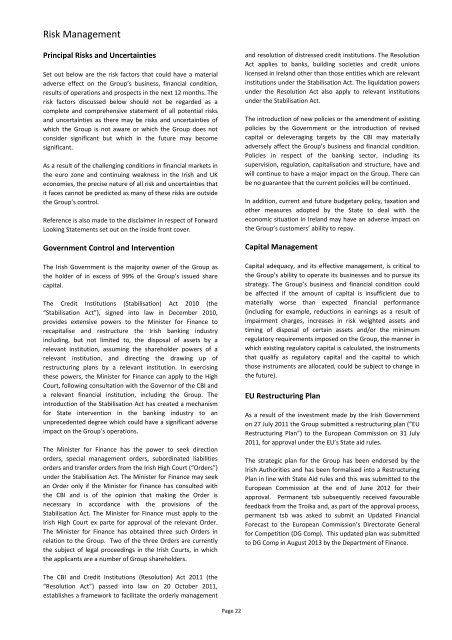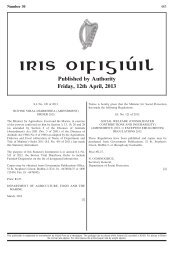ar-2013
ar-2013
ar-2013
You also want an ePaper? Increase the reach of your titles
YUMPU automatically turns print PDFs into web optimized ePapers that Google loves.
Risk Management<br />
Principal Risks and Uncertainties<br />
Set out below <strong>ar</strong>e the risk factors that could have a material<br />
adverse effect on the Group’s business, financial condition,<br />
results of operations and prospects in the next 12 months. The<br />
risk factors discussed below should not be reg<strong>ar</strong>ded as a<br />
complete and comprehensive statement of all potential risks<br />
and uncertainties as there may be risks and uncertainties of<br />
which the Group is not aw<strong>ar</strong>e or which the Group does not<br />
consider significant but which in the future may become<br />
significant.<br />
As a result of the challenging conditions in financial m<strong>ar</strong>kets in<br />
the euro zone and continuing weakness in the Irish and UK<br />
economies, the precise nature of all risk and uncertainties that<br />
it faces cannot be predicted as many of these risks <strong>ar</strong>e outside<br />
the Group’s control.<br />
Reference is also made to the disclaimer in respect of Forw<strong>ar</strong>d<br />
Looking Statements set out on the inside front cover.<br />
Government Control and Intervention<br />
The Irish Government is the majority owner of the Group as<br />
the holder of in excess of 99% of the Group’s issued sh<strong>ar</strong>e<br />
capital.<br />
The Credit Institutions (Stabilisation) Act 2010 (the<br />
“Stabilisation Act”), signed into law in December 2010,<br />
provides extensive powers to the Minister for Finance to<br />
recapitalise and restructure the Irish banking industry<br />
including, but not limited to, the disposal of assets by a<br />
relevant institution, assuming the sh<strong>ar</strong>eholder powers of a<br />
relevant institution, and directing the drawing up of<br />
restructuring plans by a relevant institution. In exercising<br />
these powers, the Minister for Finance can apply to the High<br />
Court, following consultation with the Governor of the CBI and<br />
a relevant financial institution, including the Group. The<br />
introduction of the Stabilisation Act has created a mechanism<br />
for State intervention in the banking industry to an<br />
unprecedented degree which could have a significant adverse<br />
impact on the Group’s operations.<br />
The Minister for Finance has the power to seek direction<br />
orders, special management orders, subordinated liabilities<br />
orders and transfer orders from the Irish High Court (“Orders”)<br />
under the Stabilisation Act. The Minister for Finance may seek<br />
an Order only if the Minister for Finance has consulted with<br />
the CBI and is of the opinion that making the Order is<br />
necess<strong>ar</strong>y in accordance with the provisions of the<br />
Stabilisation Act. The Minister for Finance must apply to the<br />
Irish High Court ex p<strong>ar</strong>te for approval of the relevant Order.<br />
The Minister for Finance has obtained three such Orders in<br />
relation to the Group. Two of the three Orders <strong>ar</strong>e currently<br />
the subject of legal proceedings in the Irish Courts, in which<br />
the applicants <strong>ar</strong>e a number of Group sh<strong>ar</strong>eholders.<br />
and resolution of distressed credit institutions. The Resolution<br />
Act applies to banks, building societies and credit unions<br />
licensed in Ireland other than those entities which <strong>ar</strong>e relevant<br />
institutions under the Stabilisation Act. The liquidation powers<br />
under the Resolution Act also apply to relevant institutions<br />
under the Stabilisation Act.<br />
The introduction of new policies or the amendment of existing<br />
policies by the Government or the introduction of revised<br />
capital or deleveraging t<strong>ar</strong>gets by the CBI may materially<br />
adversely affect the Group’s business and financial condition.<br />
Policies in respect of the banking sector, including its<br />
supervision, regulation, capitalisation and structure, have and<br />
will continue to have a major impact on the Group. There can<br />
be no gu<strong>ar</strong>antee that the current policies will be continued.<br />
In addition, current and future budget<strong>ar</strong>y policy, taxation and<br />
other measures adopted by the State to deal with the<br />
economic situation in Ireland may have an adverse impact on<br />
the Group’s customers’ ability to repay.<br />
Capital Management<br />
Capital adequacy, and its effective management, is critical to<br />
the Group’s ability to operate its businesses and to pursue its<br />
strategy. The Group’s business and financial condition could<br />
be affected if the amount of capital is insufficient due to<br />
materially worse than expected financial performance<br />
(including for example, reductions in e<strong>ar</strong>nings as a result of<br />
impairment ch<strong>ar</strong>ges, increases in risk weighted assets and<br />
timing of disposal of certain assets and/or the minimum<br />
regulatory requirements imposed on the Group, the manner in<br />
which existing regulatory capital is calculated, the instruments<br />
that qualify as regulatory capital and the capital to which<br />
those instruments <strong>ar</strong>e allocated, could be subject to change in<br />
the future).<br />
EU Restructuring Plan<br />
As a result of the investment made by the Irish Government<br />
on 27 July 2011 the Group submitted a restructuring plan (“EU<br />
Restructuring Plan”) to the European Commission on 31 July<br />
2011, for approval under the EU’s State aid rules.<br />
The strategic plan for the Group has been endorsed by the<br />
Irish Authorities and has been formalised into a Restructuring<br />
Plan in line with State Aid rules and this was submitted to the<br />
European Commission at the end of June 2012 for their<br />
approval. Permanent tsb subsequently received favourable<br />
feedback from the Troika and, as p<strong>ar</strong>t of the approval process,<br />
permanent tsb was asked to submit an Updated Financial<br />
Forecast to the European Commission’s Directorate General<br />
for Competition (DG Comp). This updated plan was submitted<br />
to DG Comp in August <strong>2013</strong> by the Dep<strong>ar</strong>tment of Finance.<br />
The CBI and Credit Institutions (Resolution) Act 2011 (the<br />
“Resolution Act”) passed into law on 20 October 2011,<br />
establishes a framework to facilitate the orderly management<br />
Page 22




